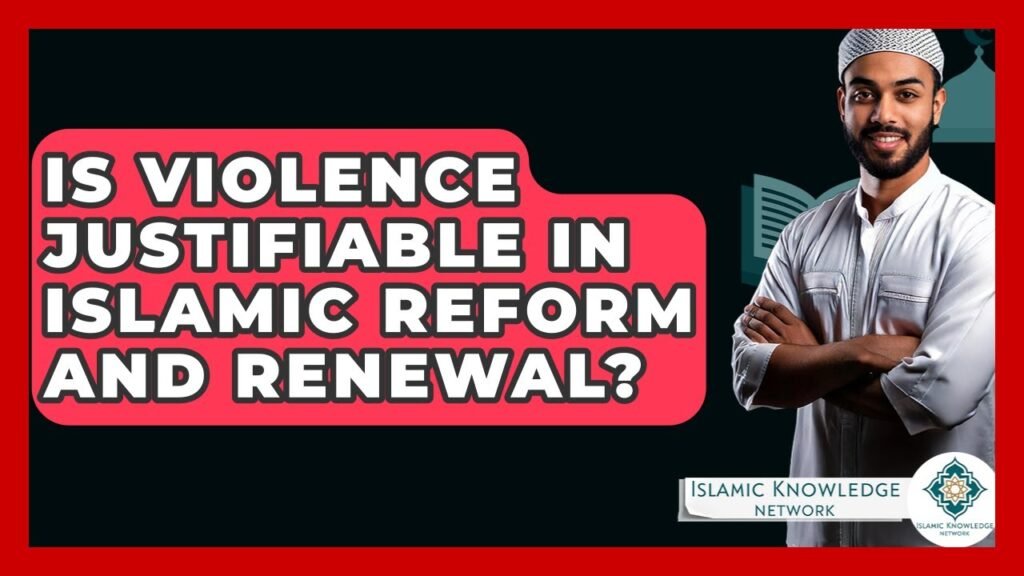You are here to read: Is Violence Justifiable in Islamic Reform and Renewal? – A Thoughtfully Written Guide Offering Spiritual Wisdom and Travel Advice for Every Pilgrim who is going on holy journey of Hajj or Umrah.
Introduction: Is Violence Justifiable in Islamic Reform and Renewal? – Islamic Knowledge Network
As contemporary discussions on the intersection of religion and modernity intensify, the debate surrounding the justification of violence in Islamic reform and renewal becomes increasingly pertinent. With a multitude of interpretations of Islamic teachings, the perspectives on violence in the pursuit of justice or reform diverge sharply among scholars and practitioners alike. This nuanced discourse invites us to explore how these interpretations align with the core tenets of Islam, which traditionally advocate peace, compassion, and tolerance.
At Airlink Hajj and Umrah, we recognize the significance of fostering informed discussions within the Muslim community and beyond. Our blog remains a valuable resource, offering updates and insights into Hajj and Umrah, while simultaneously addressing deeper theological inquiries such as the one presented here. As we strive for spiritual fulfillment during these sacred journeys, we must also engage with contemporary issues that affect our understanding of faith and its role in advocating for positive change. Join us in this important dialogue as we seek to understand the complexities of violence in the context of Islamic reform, and how our beliefs can guide us toward a path of peace and renewal.
Is Violence Justifiable in Islamic Reform and Renewal?
The question of whether violence is justifiable in Islamic reform and renewal is complex and multi-faceted. Many scholars argue that Islam, at its core, advocates for peace, compassion, and justice. The emphasis on non-violence is exemplified in the teachings of the Prophet Muhammad, who employed dialogue and diplomacy rather than force to resolve conflicts. Promoting understanding and reconciliation is often seen as a more effective approach to reform.
Furthermore, the majority of Muslims around the world endeavor to interpret their faith through a lens of peace and progress. They believe that meaningful reform arises from education, community engagement, and cooperative dialogue rather than through violent means. This perspective is pivotal, especially given the current global climate, which requires unity and understanding to counteract extremism.
It is also essential to recognize that, while some radical groups may resort to violence to claim legitimacy, the broader Islamic community strives for peaceful expressions of reform. If you’re interested in understanding Islamic practices further, our blog at airlinkhajjandumrah.com offers comprehensive updates on Hajj and Umrah, fostering a deeper connection to the peaceful principles of Islam. In a world searching for solutions, embracing non-violence may be the most profound form of renewal.
You're at the middle of this awesome post at AirlinkHajjandUmrah.com through: Is Violence Justifiable in Islamic Reform and Renewal?. Keep reading, it gets better!
FAQ on Is Violence Justifiable in Islamic Reform and Renewal?
FAQ 1: What is the context of violence in Islamic reform and renewal?
Violence in Islamic reform and renewal is often discussed in relation to historical and contemporary movements seeking change within the Muslim world. Understanding the socio-political landscape, including colonialism and authoritarian regimes, is key to this discussion.
FAQ 2: Are there specific historical examples where violence was used in the name of reform?
Yes, throughout history, various groups have resorted to violence in attempts to reform Islamic societies. Examples include the actions of radical factions during the Arab Spring and movements like Al-Qaeda or ISIS, which claim ideological justifications for their violent methods.
FAQ 3: What are the main arguments against the justification of violence in reform?
Critics argue that violence undermines the core principles of Islam, such as compassion and justice. They advocate for peaceful methods of reform through dialogue, education, and community engagement, emphasizing the potential for positive change without resorting to violence.
FAQ 4: How do contemporary scholars view the issue of violence in Islamic reform?
Contemporary scholars exhibit diverse opinions. Some advocate for non-violent approaches and emphasize interpreting Islamic teachings in ways that promote peace, while others may argue that in desperate situations, the use of force could be seen as a last resort.
FAQ 5: What role do socio-economic factors play in the justification of violence?
Socio-economic disparities, political oppression, and lack of access to education can fuel frustration and lead individuals or groups to view violence as a viable option for achieving reform. Addressing these underlying issues is often seen as crucial in preventing violence and promoting sustainable change.
That wraps up Is Violence Justifiable in Islamic Reform and Renewal?. Thanks for sticking with us till here! Share this: Is Violence Justifiable in Islamic Reform and Renewal? with your friends.
Check our homepage at Air Link Hajj & Umrah for more awesome updates.
Some interesting posts are: 1: Umrah Mubarak, 2: When is Umrah closed 2026?, 3: When does Umrah start after Hajj 2026?
Mushu, an experienced Saudi Arabia traveler and writer, shares insightful tips and spiritual reflections to enhance Hajj and Umrah journeys for fellow pilgrims. He has been to Makkah and Madina from 2016 to 2023 many times and his posts will reflect this.







